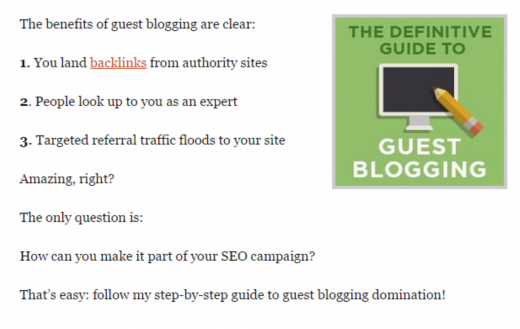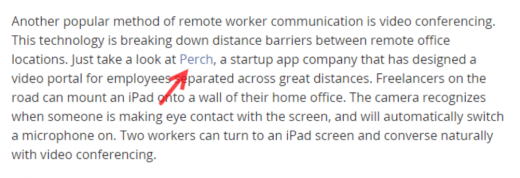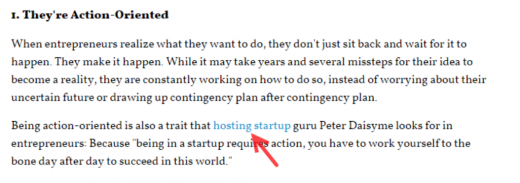And more than losses, sites that did good work after being burnt by earlier updates are seeing good recoveries in visibility and rankings.
However, Google has passed over a menace it’s been threatening to exterminate for quite some time now: guest blogging for links.
In his Happy New Year to SEO message earlier this year, Matt Cutts minced no words in advising marketers to stick a fork in it. But even though we witnessed the subsequent drama of the My Blog Guest penalty, in my opinion, all hell (in the true sense of the word) is yet to break loose.
Penalties dished out for guest blogging have mostly been manual up to this point. Google is yet to punish us with a guest blog penalty that scales.
So what I’m actually wondering is, “What if Google had penalized sites for links from guest posts with Penguin 3.0?”
Why would it do that?
The closest you can come to guessing what Google intends (not what they mean) is to read the Link Schemes section of its Quality Guidelines. Google say it’d look to deal severely with these types of link schemes:
Side note: The said page mentions PageRank more than a quarter of the times it mentions links. And it links to the Wikipedia entry of PageRank, which has been classified as outdated.
Penalizing sites for guest posts with plugged links will be a utopian achievement for Google’s spam detection algorithm, because the patterns are harder to detect, compared to directory and article sites. But that’s not going to stop Google. It’s got a job to do.
- “Land backlinks from authority sites?” Eh?
- “Part of your SEO campaign?” No!
- “Guest blogging domination!” Please!
Can Google do that?
Penguin could even incorporate Panda-like text/image signals (it already reads anchor text) to raise the bar of naturalness. Google would basically look at the sites from where you’re getting your links, and ask these questions:
- Are these sites of good quality in terms of perceived trust and editorial control?
- Are they in the same niche as, or do they have a category topically relevant to, the entity being linked to?
- On a balance of probabilities, does it appear they might accept compensation for links?
How would Google do that?
Fool’s Gold
There are a few linking patterns characteristic of guest posts that Google can identify (and penalize) with little effort. In fact, it’s already doing so in many cases.
The first? Links from author bio. Duh. And while you’re at it, don’t think links with “brand anchor text” are safe. We all know how linking with exact-matchanchor text was considered a no-brainer as opposed to “Read more” for so long.
Google can figure out, with the same ease as the author bio, patterns in the backlink profile (authority range), speed and interval of acquisition (“campaign” alert), and authorship of the content. James Finlayson warned us about it quite some time ago.
Google might also be able to figure out if different authors associated with the same company are linking to the same sites from their articles. This is one pattern that unambiguously associates a marketing agency with their client.
Google has gathered all the user profile information they can from “content marketers” with its three-year long authorship scheme (which, incidentally, in Google’s own words, wasn’t “adopted” by anyone outside the SEO community). That they have stopped showing author information in search results is no reason to assume it isn’t using it internally for other purposes.
There are the in-between sites referred to as “community” or “niche” blogs. I like to think of them as the poor man’s Buzzfeed. They are usually well designed and have lots of engagement and inputs from the niche/community they cater to. It’s easy to get your post on them, because they publish members’ posts with little to no moderation.
It’s a cakewalk to spot unnatural guest posts on such sites. The classic modus operandi that spammers (I hate calling my bedfellows that) follow is sign up, fill out a profile, publish a post with typically two “contextual” links: one to a site you’ve never heard of and the other to Wikipedia.
Google has been increasingly targeting community sites in manual penalties; so they are now an endangered species.
When SEOs graduate to linking from within the content on blogs with editorial control, the first thing they do is list posts with a client’s site as one of the items. You’ve all seen the “5 Tools that Project Managers are Raving About” post (with aesthetic screenshots) delving into the nitty-gritty of Basecamp, Asana, Trello, Zoho and BrixHQ.
BrixHQ? That’s the one. How difficult do you think it is for Google to distinguish software that has 100 users from four others that have thousands? Or to pick a site ranking on page 15 from six others ranking on page 1 or 2?
Google targets not only sites with a bad inbound link profile, but also those with a bad outbound link profile. And these sites have – hold your breath – site-wide patterns.
For example, there are some that insert links from your guest posts to their money pages. Their editors are the human manifestations of infolinks.
Other sites destined for grim penalties are those with posts unrelated to their core theme.
Clicking through to the post, you find that it links to Shea Homes, and is authored by Now Sourcing (or their president, depending on the way you look at it). They’re a social media firm specializing in infographic design. You bet they know all about real estate!
Getting cleverer
So Google can spot a client’s link in a list of tools or tell it apart from Wikipedia. Then what does a smart guest blogger do?
Have more “researched” links to posts on other blogs and sneak one to their client in. Bad luck: The client wants a branded link. And so you have one link to a tool along with five others to articles. Odd one out!
Hostt.com now has a blog (going forward, they’ll acquire links to their posts), but guess who has authored all the posts?
The other links in the above article are still bona fide, similar to those in point #1. But, you (and Google) can make out what stands out.
Say Googlebot spots this link and decides to investigate further. They might find that another authoritative author has linked to it from another authority site:













